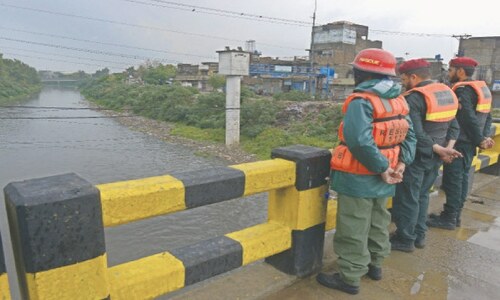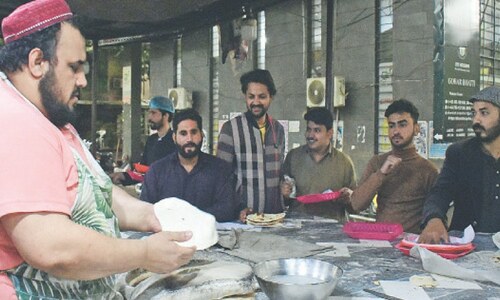The Punjab chief minister has proposed the establishment of ‘front desks’ in police stations, in a bid to change thana culture – police misbehaviour that discourages citizens and victims of criminal activity to turn to the police for assistance.
The construction of these ‘front desks’ has already begun at 14 police stations and the number of front desks to be constructed has now been increased to 18, to be completed in two phases. The Punjab government has issued a grant of Rs7million for the project with Rs500,000 to be spent on setting up a ‘front desk’ at each of the 18 police stations.
In the first phase, ‘front desks’ will be set up at the Potohar Division’s Cantt, Morgah, R.A. Bazaar, Civil Lines, Airport, Wah Cantt and women police stations. In the Rawal Division, ‘front desks’ will be established at Pirwadhai, City, Waris Khan, Banni and New Town. In the Saddar Division, they will be set up at Rawat, Mandra, Gujar Khan, Saddar Bairooni and Murree.
A ‘front desk’ is a separate room in which “well educated” police personnel and computer technology experts will be posted at to facilitate citizens. A computerised record of the complaint will be kept at the front desk, and information on police operations – such as driving licences, police character certificates, FIR registration and vehicle verification, will be provided as well. However, the personnel at the front desk will not be empowered to register an FIR.
Between 2008-2010, then additional inspector general of police Nasir Khan Durrani established separate reporting rooms named ‘FIR Rooms’ in order to change thana culture. Other bids to change police attitudes include the introduction of online FIR registration. Eight police stations of the Rawalpindi district were also declared ‘model’ police stations, while other stations were converted to Darul Aman.
However, most police officials remain unconvinced that these ‘front desks’ will end thana culture. They said public funds would be better spent on welfare for low-ranking police personnel.
“We need to strengthen the basic unit of police – the police station. Funds should be provided to facilitate the existing police force, which should not be engaged in irrelevant jobs like anti-dengue campaigns, removing encroachments and so on,” a senior police official said.
He said thana culture would not change until policing at the station level was improved. The official said he was not against the formation of new police units, but the existing force needed to be provided basic requirements, such as manpower, transport and other basic facilities that are provided to army personnel.
He said police deployed at checkpoints are not provided drinking water, pick and drop services, meals and other facilities that are provided to other security personnel.
He said police stations lack sanitation employees – occasionally, suspects are used to clean the police station.
Regional Police Officer Mohammad Sultan Raja said the move to set up ‘front desks’ would facilitate ordinary citizens.
“The complaints of the people will be received immediately and without any hurdles by police officials deployed at the front desk. Previously, people had to wait to register their complaints with relevant police stations,” Mr Raja said. He said these measures had been taken to improve the police’s image and attend to any citizen who approached the police.
He said the ‘front desk’ would be linked to senior police officials who could oversee the status of complaints.
Under the existing procedure to register complaints and FIRs, a citizen or victim goes to the local police station and meets the muharar to submit a complaint. The muharar in turn decides what action will be taken, and whether a duty officer will be informed.
But these steps to improve thana culture will remain largely cosmetic since front desk officials will not be empowered to register cases. Complainants will continue to turn to officials, such as a muharar or a sub-inspector to register cases, continuing the cycle of bribery and corruption.
Mr Raja speculated that the move was geared at preventing citizens from approaching senior police officials in order to register or resolve their complaints.
Published in Dawn, May 14th, 2016














































Dear visitor, the comments section is undergoing an overhaul and will return soon.